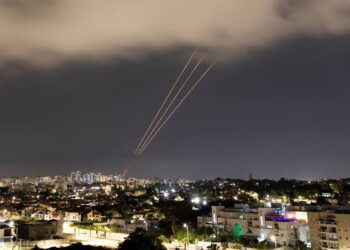World leaders Sunday called for restraint following an unprecedented attack from Iranian drones and missiles that drew widespread condemnation and sparked fears of a broader conflict.
Iran’s overnight barrage from late Saturday was its first-ever direct assault on Israeli territory and came in retaliation for a deadly strike on Tehran’s consulate in the Syrian capital.
It remained unclear how Israel would respond to this major escalation in the long-running covert war between the regional foes which has been further inflamed by the Gaza war raging since October 7.
Israel’s top ally the United States cautioned against an escalation after the attack that was largely foiled, with the Israeli army saying 99 percent of the launches had been intercepted.
White House National Security Council spokesman John Kirby said on NBC’s “Meet the Press” Sunday: “We don’t want to see this escalate. We’re not looking for a wider war with Iran.”
However, Israeli Defence Minister Yoav Gallant said “the campaign is not over yet – we must remain alert.”
Iranian President Ebrahim Raisi warned Israel against a “reckless” retaliation, saying it would face “a decisive and much stronger response”.
Iran said its drone and missile attack came in response to the April 1 air strike on Tehran’s consulate building in Damascus, an attack widely blamed on Israel.
Syria said Sunday Iran had exercised its “right to self-defence.”
Iran’s Foreign Minister Hossein Amir-Abdollahian said Tehran had notified neighbouring states ahead of Saturday’s attack, stressing its aim was “to punish the Israeli regime”.
– UN Security Council meeting
US President Joe Biden reaffirmed Washington’s “ironclad” support for Israel, while appearing to guide its staunch ally away from a military response.
Other world leaders also urged restraint, ahead of a 2000 GMT United Nations Security Council emergency meeting requested by Israel.
G7 nations were also holding a video conference to discuss the attack.
Iran launched more than 300 drones and missiles towards Israel late Saturday, injuring 12 people, Israel’s military said.
One of those wounded was a seven-year-old girl near the southern town of Arad who was in intensive care.
Most of the drones and missiles were intercepted before reaching Israel, the army said, with help from the United States, Jordan, Britain and other allies.
The attack came as fighting between Israel and Hamas raged in Gaza, and the latest attempt to reach a ceasefire in the war appeared to falter.
News outlet Axios said Biden told Israeli Prime Minister Benjamin Netanyahu that Washington would oppose an Israeli counterattack and that he should “take the win.”
British Prime Minister Rishi Sunak called for “calm heads to prevail,” adding that UK warplanes had also shot down Iranian attack drones.
NATO said it was “vital that the conflict in the Middle East does not spiral out of control.”
And Pope Francis called for “an end to any action which could fuel a spiral of violence.”
– Iran’s attack ‘foiled’
Israeli military spokesman Rear Admiral Daniel Hagari said that 99 percent of the launches were intercepted, declaring that “the Iranian attack was foiled”.
While 170 drones and 30 cruise missiles were shot down before reaching Israel, a few of the 110 ballistic missiles did get through, the Israeli army said.
Iran’s proxies and allies also carried out coordinated attacks on Israeli positions.
AFP correspondents heard blasts in the skies above Jerusalem early Sunday, and overnight people sought cover.
On Sunday morning, people began returning tentatively to the streets.
“The situation is really frightening because we are afraid of what happens and all of the bombing and aircraft that are coming,” said 48-year-old Jerusalem resident Ayala Salant.
The Iranian army declared that its attack was “completed successfully”, and that it was in “self defence” after the Damascus strike which killed seven of Iran’s Revolutionary Guards including two generals.
Iran’s “Operation Honest Promise… achieved all its objectives”, armed forces chief of staff Mohammad Bagheri said.
Bagheri said the attack targeted an intelligence centre and the air base from which Tehran says the Israeli F-35 jets took off to strike the Damascus consulate.
“Both these centres were significantly destroyed,” he said, although Israel said there was only minor damage.
Analyst Nick Heras of the New Lines Institute for Strategy and Policy told AFP Saturday’s attack was “all about satisfying the honour of Iran”.
“This recent escalation in the Middle East is about the treacherous state of US and Iran relations, in which Israel is just one arena of conflict,” he said.
– Hezbollah rocket fire
Hundreds of Iranians in Tehran’s Palestine Square waved Iranian and Palestinian flags in support of Iran’s military action.
Israel, Iraq, Jordan and Lebanon all said they had reopened their airspace after suspending air traffic during the attack.
Jordan said it intercepted “flying objects” in its airspace during the attack.
Iran’s allies in the region joined the attack, with Yemen’s Tehran-backed Huthi rebels also launching drones at Israel, security agency Ambrey said.
Lebanon’s Hezbollah movement said it had fired rockets at Israeli positions in the annexed Golan Heights around the same time, and another barrage hours later.
An Israeli strike destroyed a building used by Hezbollah in east Lebanon on Sunday, Israeli and Lebanese sources said.
Iran’s mission to the United Nations warned Washington to keep out of its conflict with Israel.
It added on X that “the matter can be deemed concluded”.
“However, should the Israeli regime make another mistake, Iran’s response will be considerably more severe.”
Before Tehran attacked, Israel’s military warned Iran it would suffer the “consequences for choosing to escalate the situation any further”.
Iran had earlier seized an Israeli-linked container vessel in the Gulf, putting the whole region on alert.
Israeli directs war cabinet to respond
And in a related development, the Israeli security cabinet has authorized the three-man war cabinet to decide on Israel’s response to the attack.
The authorisation comes after Israel faced more than 200 “threats,” according to the Israel Defense Forces.
The war cabinet comprises Prime Minister Benjamin Netanyahu, Minister of Defense Yoav Gallant and Benny Gantz.
Meanwhile, Israel’s Home Front Command has cancelled its request for residents across the country to stay close to shelters.
The reversal comes hours after the Israel Defense Forces instructed residents of several parts of northern Israel to stay near protected spaces and mandated that residents wait in “the most protected area possible” for at least 10 minutes “upon the activation of sirens.”
…Hold US, UK for peace in M/East – Onanuga
Meanwhile, spokesperson to President Bola Ahmed Tinubu, Mr Bayo Onanuga, has said the United States of America and the United Kingdom must be held responsible for peace in the Middle East.
Onanuga stated this Sunday in a statement via his official X handle.
He said the US and the UK should ensure that the Israeli response to Iranian drones and missiles is not disproportionate.
Onanuga said the view is his personal opinion and doesn’t come from the Presidency, where he serves.
He said the conflict could degenerate, urging the UK, and the US to mediate.
According to him, there is a need for caution all round, adding that, with Gaza yet unresolved, the world does not want another war in the Middle East.
He said: “United States of America and the UK owe the world the responsibility for peace in the Middle East by ensuring that Israeli response to Iranian drones and missiles is not disproportionate. Israel first drew blood by attacking the Iranian embassy in Damascus, killing some Iranian military officials.
“Iran promised some retaliation against Israel which it did Saturday by raining drones and missiles in Israeli direction. Many of them were intercepted. Times of Israel has reported one injury.
“Iran said it has concluded its retaliation to Israel’s first attack. But Israel is planning a massive response. With Jordan, Syria and other countries closing their airspace, Iranian Defense Minister Mohammad Reza Ashtiani threatened a firm response to any country that “opens its airspace or territory for attacks on Iran by Israel. This conflict can degenerate.
“The UK, USA should mediate. There is need for caution all round. With Gaza yet unresolved, the world does not want another war in the Middle East.”




